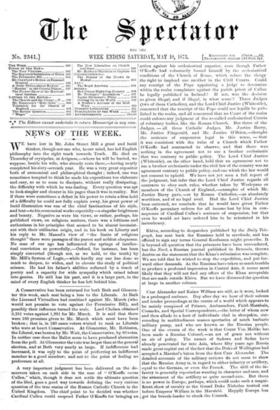A very important judgment has been delivered on the de-
murrers taken on each side in the case of "O'Keeffe versus Cullen," which, though it does not settle the ultimate question of the libel, goes a good way towards defining the very curious question of the true status of the Roman Catholic Church in the United Kingdom. The chief point to be decided was whether Cardinal Cullen could suspend Father O'Keeffe for bringing an action against his ecclesiastical superior, even though Father O'Keeffe had voluntarily bound himself by the ecclesiastical conditions of the Church of Rome, which refuse the clergy the right to implead one another in the Civil Courts. Could any rescript of the Pope appointing a judge to determine within the realm complaints against the parish priest of Callan be legally published in Ireland? If not, was the decision so given illegal, and if illegal, in what sense ? Three Judges (two of them Catholics), and the Lord Chief Justice (Whiteside), concurred that the rescript of the Pope could not legally be pub- lished in the realm, and all concurred that no Court of the realm could enforce any judgment of the so-called ecclesiastical Courts of voluntary bodies, like the Roman Church. But three of the Judges, — all three Catholic Judges, Mr. Justice Barry, Mr. Justice Fitzgerald, and Mr. Justice O'Brien,—thought the sentence of suspension legal in this sense, — that it was consistent with the rules of a Church which Father O'Keeffe had contracted to observe, and that there was nothing in the agreement not to sue a brother ecclesiastic that was contrary to public policy. The Lord Chief Justice (Whiteside), on the other hand, held that an agreement not to sue a brother ecclesiastic under the civil law of the country was an agreement contrary to public policy, and one which the law would not consent to uphold. We have not yet seen a full report of the judgment, but infer that the Lord Chief Justice regards all contracts to obey such rules, whether taken by Wesleyans or members of the Church of England,—examples of which Mr. Justice Barry gave, —or by Roman Catholics,—as absolutely worthless, and of no legal avail. Had the Lord Chief Justice been outvoted, we conclude that he would have given Father O'Keeffe pecuniary redress for all income lost by him in con- sequence of Cardinal Cullen's sentence of suspension, but that even he would not have ordered him to be reinstated in his incumbency.


































